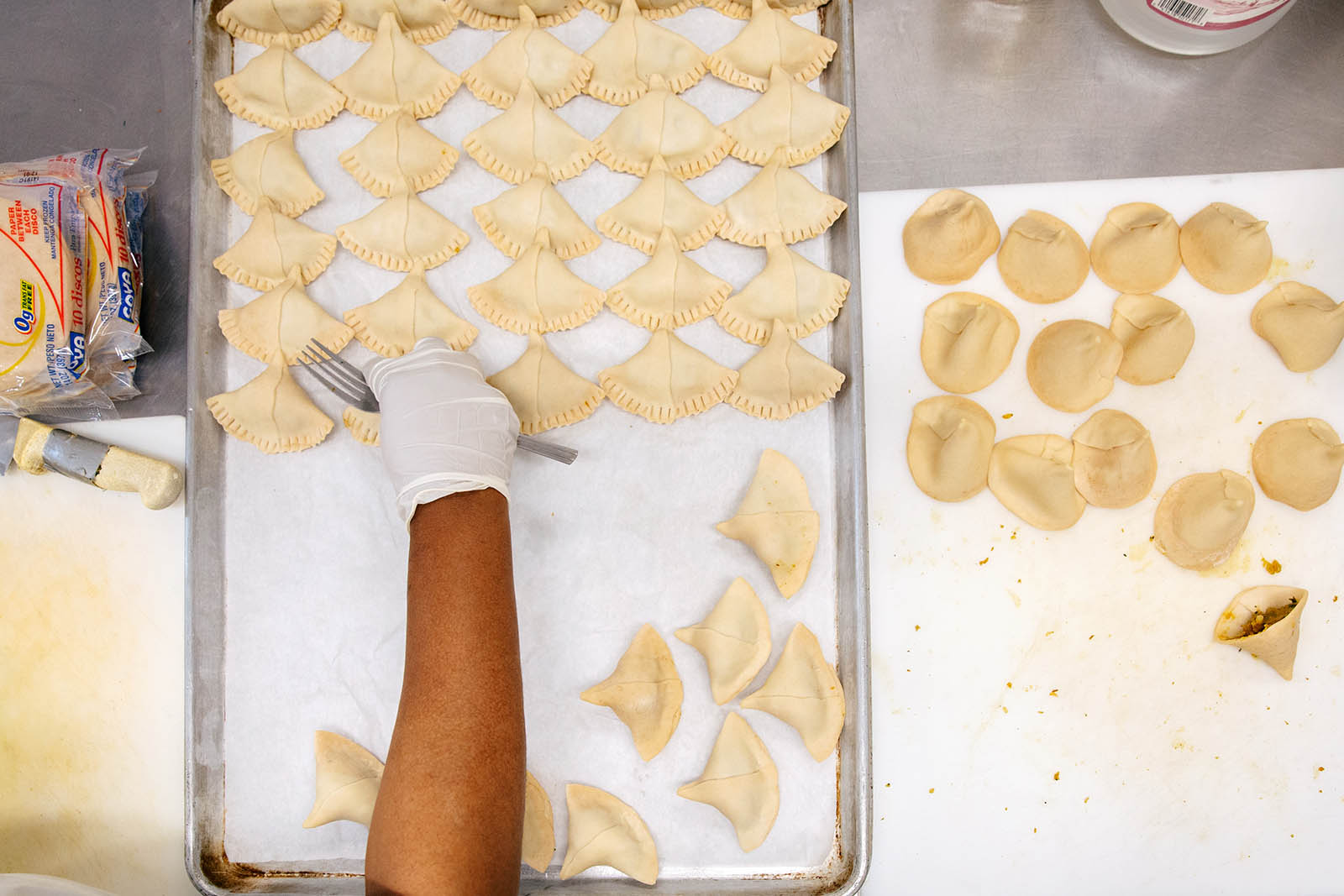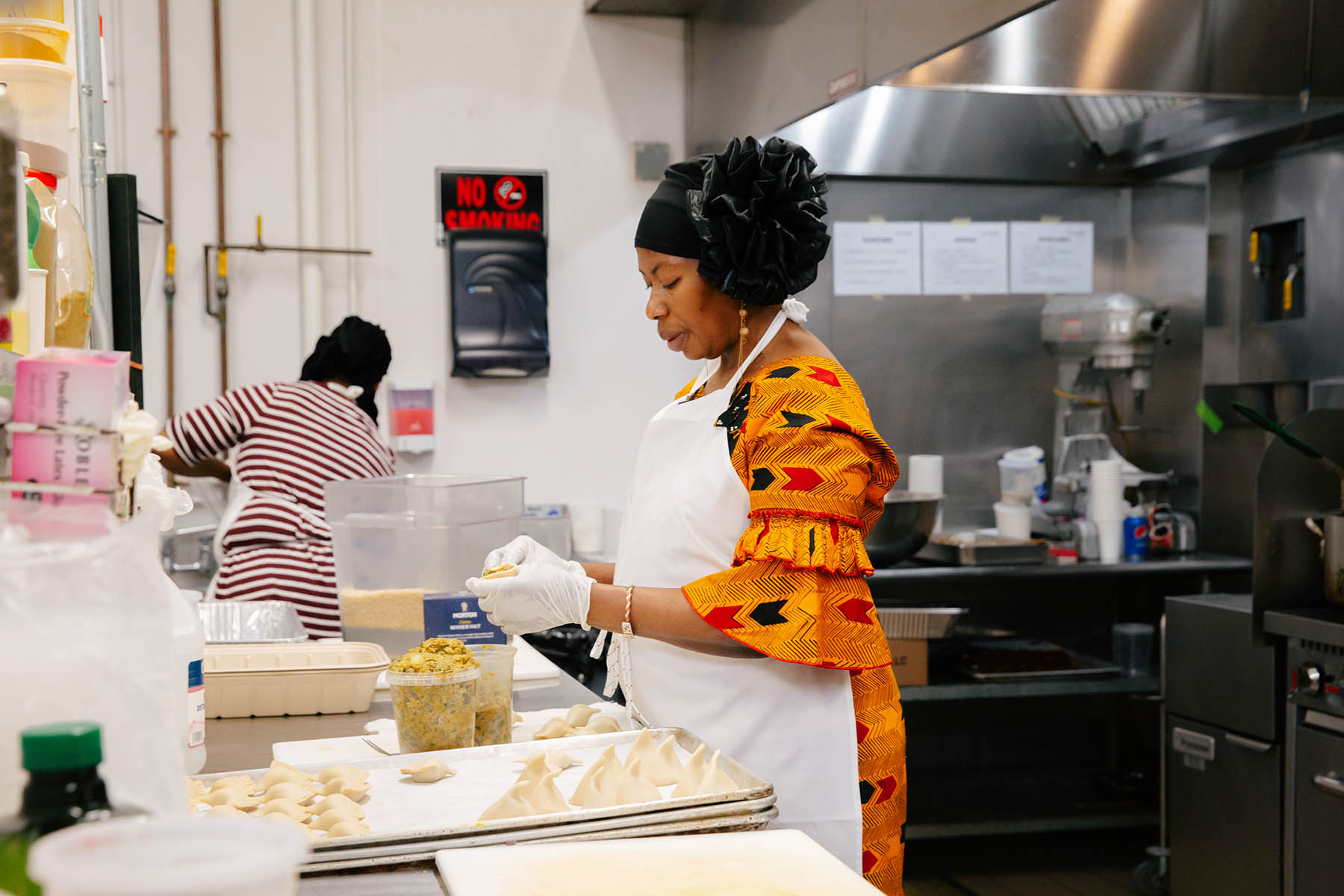Startup founders have infamously unpredictable daily schedules as they work to establish and grow their businesses. What does such an entrepreneur’s weekly, daily, or even hourly routine look like when sometimes there aren’t enough hours in a day? In the Startup Diaries, founders walk us through a week in their lives and show what it really takes to get a fledgling business off the ground.
Every great business starts with a problem. In the case of Eat Offbeat, that problem was hummus.
Cofounder Manal Kahi, who’d immigrated to the United States from a small town in Lebanon in 2013, couldn’t seem to find a decent batch of it in all of New York. So she called her Syrian grandmother for the family recipe, and along with her brother, Wissam, began mulling an idea: What if they started a catering company that delivers authentic, homestyle meals in New York? What if those meals were cooked by refugees?
The idea, of course, was about more than hummus. “It was the midst of the Syrian refugee crisis back home, and I was here,” Kahi says. (She was attending graduate school at Columbia University.) “I had some level of guilt in the back of my mind.” In 2015, she and Wissam (who now works for the business in a mostly advisory capacity) partnered with the International Rescue Committee, an agency that helps refugees resettle, and hired their first three cooks. Then, with a commercial kitchen secured and a website up and running (built by Kahi’s husband), Eat Offbeat was in business.
One of Kahi’s professors placed the company’s first order, which led to three more orders; before she knew it, Kahi was fulfilling 20 to 30 orders a month through word of mouth. The company’s growth has been steady since then, doubling year over year, Kahi says, but her first big break came when she won at WeWork’s New York Creator Awards in 2018, then placed as a finalist in the Creator Awards Global Finals. (Each honor came with a $180,000 grant.) While she was onstage pitching at the latter event, WeWork cofounder Adam Neumann surprise-ordered 1,000 meals per week. “I’m like, ‘Of course. We can do anything,’” Kahi, a member of WeWork 27-01 Queens Plaza N, remembers. “And it really happened… That was a major turning point.”
Today, the company has 28 full-time and part-time employees, including chefs from Iraq, Senegal, and Sri Lanka, and Kahi’s goal is to triple her orders by 2020. (She currently gets between 150 and 200 a month.) “Most of the team left [their countries] with very little—they couldn’t bring much from their homes,” Kahi says of the passion her staff brings to the kitchen. “All you’re left with is all the memories—and the cooking,” she says. “That’s the only thing that still connects you to home.” Just ahead of World Refugee Day, Kahi shares a recap of a recent workweek.

Monday
10:20 a.m. Getting started a little late—typical for Monday. Write my to-do list on a Post-it note.
10:30 a.m. Check our custom-built order management platform to see what came in over the weekend. My husband’s company, PolarStork, builds all our tech.
10:45 a.m. Evaluate a potential partnership opportunity to determine whether it makes sense. Basically, a company that sells prepackaged foods is looking for a subcontractor to do the cooking and assembly, and we could be that subcontractor. This is way outside our current business model, but it’s something we’re considering.
10:50 a.m. Receive an email from our cookbook editor—a first pass on our pages! Too scared to open. We launched a Kickstarter campaign to self-publish a cookbook in late 2016, then a couple of publishers wound up approaching us, and we moved forward with Workman Publishing.
11 a.m. Hold a three-hour intro meeting with our new head of growth at the office above our kitchen in Long Island City, Queens. We’ve been growing over the past three years through word of mouth and our own network. Of course that’s been great, because we’ve gotten a lot of orders with very little marketing dollars or effort, but the goal now is to set up a real, outbound sales process that targets the corporate sector.
2:15 p.m. Give a tour of the kitchen downstairs. Chef Shanti offers us a fresh, pink chia-seed drink.
3–4 p.m. Weekly team action meeting with the admin group. It lasts one hour sharp—a feat.
4:15 p.m. Take a walk with our customer experience manager to discuss customer feedback. We send an automated survey after every order is completed to get feedback on the quantity and quality of the food we deliver, and the quality of the experience. Usually we have a weekly “quality meeting” with the whole team, too, but we’ve had to push it the past few weeks because we’ve been busy. Honestly, it’s my fault.
4:30 p.m. Back at the kitchen. Take part in a training for our delivery team. The delivery position is the most challenging to fill—we have peaks around lunchtime and then around dinner, but there’s nothing in between, so it’s hard to create full-time jobs. The way we’ve solved for that is by hiring the sons and daughters of our chefs. Most of them are in college, and they do this as a side job. They’re super invested because it’s their mother’s or father’s food, and the chefs are happy because they have an eye on their kids.
5:15 p.m. Answer emails.
5:30 p.m. Organize sales data and share it with our accountant so we can close May accounting ASAP.
7 p.m. Bike back home.
8 p.m. Reheat leftovers for dinner with my husband. Chat about our days, then remember a new feature we need for our website, which gets him back on his computer, creating tickets for his team. A lot of our tech conversations happen over meals.
Tuesday
10 a.m. More tech talk, this time over breakfast. We schedule a meeting with the rest of the team to discuss workflow for a chatbot that will answer customer questions right on the website.
11 a.m. Answer emails from home before heading to an event.
12:30–2 p.m. Speak to a group of social entrepreneurs from Latin America over a lunch catered by Eat Offbeat.
3:30 p.m. Meet with the team re: upcoming special events. We’re starting to reduce special events because they take a lot of coordination—writing a proposal, doing a walk-through of a venue, etc.—and what we want is more work for the chefs and less on the admin side.
4 p.m. Chat with our kitchen manager about the partnership opportunity I was looking into yesterday. Adjust assumptions based on his input.
5 p.m. Categorize “uncategorized expenses” for accountant.
7 p.m. Yoga followed by dinner. I try to work out two times a week but it doesn’t always happen.

Wednesday
10 a.m. Attend a small business expo at the Javits Center. Take a quick tour for ideas and potential suppliers, and connect with a business that prints marketing collaterals (at some point, we want to produce pens or different types of swag to include in our deliveries) and an outsourced-HR service.
12 p.m. Quick lunch with my husband, then back to the kitchen.
1 p.m. Meet with operations manager. One thing to discuss: why our Uber spending doubled this month. We’re still investigating.
2 p.m. Emails.
3 p.m. Long meeting with our cookbook editor to go over first pass of the cookbook.
6:30 p.m. Attend the five-year celebration for the Columbia Startup Lab at WeWork 175 Varick St. Reconnect with friends and fellow entrepreneurs. It helps when I meet with other entrepreneurs and see that they’re going through the same things I’m going through, and I’m not alone in this. When I don’t see or talk to others who are doing something similar, I get depressed and feel like things are moving too slowly.
Thursday
9:30 a.m. Sales call with a potential customer (a women’s group at a large tech company).
10 a.m. Bike to the kitchen.
10:30 a.m. Answer emails.
10:45 a.m. Coordinate a World Refugee Day event with one of our chefs, WeWork, and UNHCR, the UN Refugee Agency. Eat Offbeat will serve food at the event and give a quick cooking demo with one of our chefs and a food celebrity. (I don’t know who yet! The UNHCR is coordinating.)
11:30 a.m. Call with a young woman who works in the social VC space. She recently cold-emailed me and offered to help with fundraising efforts. My biggest challenge as an entrepreneur changes every month, and right now it’s fundraising. It’s been a little slower than expected, and I think part of it is that I need to get faster at approaching people.
12:30 p.m. Sales meeting.
4 p.m. Meet Wissam in Manhattan to discuss sales strategies.
6 p.m. Back to Long Island City for drinks with the team. We’re officially welcoming our head of growth.
Friday
10 a.m.–12 p.m. Revisit our pitch deck, which we’re finalizing for fundraising.
12 p.m. Thirty-minute call with our accountant to review May data, go over irregularities, and close the month.
12:30 p.m. Lunch. The chefs cook “family meal” every day for the whole team, usually using leftover food and ingredients, and sometimes to test new dishes. Today, I join them.
1:30 p.m. Look ahead and start planning for next week.
3 p.m. Brainstorm with the tech and Eat Offbeat teams to discuss possible customer-service scenarios that a chatbot could handle.
5:45 p.m. Head out for drinks, where the bot conversation continues, then home for the weekend. When we started, in the first two years, I was working nonstop, including weekends, and I got burned out. Now I have a rule: I never work on weekends, and if I have to, I make sure to give myself another day off during the week. Honestly, I wouldn’t have been interested in starting a business—I never considered myself an entrepreneur!—but I had a desire to make a social impact. That’s what this business is about, and that’s what I keep in mind when the days get challenging.







